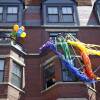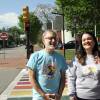People who stop by Boston City Hall Plaza this month will see 10-foot-tall portraits of more than 30 local leaders who represent LGBTQ+ pride. It's part of a photography exhibit called Portraits of Pride, which first opened on the Boston Common last October.
The exhibit includes legends like political activist Anne Maguire , religious leaders like Reverend Brandon Thomas Crowley of Myrtle Baptist Church, and his husband, Tyrone Sutton, who is the assistant head of school at Boston Arts Academy; and the state’s first openly lesbian governor, Maura Healey.
Standing among the portraits on City Hall Plaza, Jean Dolin, the exhibit’s curator and creative director, said he was drawn to the project through a desire to tell the stories and histories of LGBTQ+ people on a large scale.
“We're all so used to this idea of having 10-feet-tall statutes of old white men that have died, and who probably killed thousands of people. And we called them heroes,” Dolin said. “So I figured if there are any heroes to be celebrated, it will be people that are alive today and that have really helped society advance, and that have led the LGBTQ movement forward.”
Among the people photographed: Dr. Kenneth Mayer, medical research director and co-chair of The Fenway Institute, who worked on HIV/AIDS; Gary Daffin, co-chair of the Massachusetts Gay & Lesbian Political Caucus; and retired Supreme Judicial Court Justice Margaret Marshall.
“You’ll notice we don't have the descriptions this year,” Dolin said. “I didn't want people to read names or read who they are, but really just relate to the picture.”
Photographer John Huet captured the portraits wherever the subjects were most comfortable, said Dolin.
“We go to everyone's home if they choose, to places of worship, their favorite parks or places where the meditate,” Dolin said. “The photoshoot can take anywhere between two to three hours to seven hours. So at some point the subjects tend to get tired and that's when you really get the good portraits, because they're not posing anymore.”

The exhibit’s location at Boston City Hall Plaza means “almost everything,” Dolin said.
“Boston played a huge role in really propelling the LGBTQ movement forward,” Dolin said. “So many people come to visit. It's a government official agency. It's a public office. It's sort of like a stamp of approval.”
Of course, it's not a celebration for everyone. Last year, the portraits were vandalized more than once. The photo of Boston's first LGBTQ+ Advancement Chief, Quincy Roberts Sr., was covered in permanent marker. Others were slashed through the metal just days before the exhibit closed.
With around-the-clock security on City Hall Plaza, Dolin said he isn't worried about that happening this time, but he is aware of the pushback that such a display of pride can attract.
“I was really sad to see, first of all, the work of John Huet being vandalized,” he said. It’s part of the pain of being the first person to do something, Dolin said. When people shatter glass ceilings, the shards can hurt.
“People always celebrate you for being first, but then there's always the bruises you acquire, and the pain,” he said. “I sort of experience it as the price a lot of them have to pay by being the first to have done something, to have led this office, to have taken on a role, to have come out.”
More Local News
Dolin, who was born in Haiti, said he appreciated the people who built up Boston’s LGBTQ+ community.
“There definitely are a lot of LGBTQ people [in Haiti], but they're not celebrated, they're not supported,” Dolin said. “If anything, they are discriminated against and cannot really live their lives fully. But when I moved here over a decade ago, I was able to be my full self because all of these people have laid down the groundwork and have done everything they could to make sure me, a little gay guy immigrant from Haiti, could be my full self.”
Dolin said he’s thinking of taking the exhibit to other places, like Florida and Texas. Even with anti-LGBTQ rhetoric, Portraits of Pride could be a celebration of those still existing and fighting every single day, he said.
He doesn’t have his own portrait in the exhibit. But if he did, he has an idea of what it could look like.
“If I were to paint a portrait of me, I would honestly have it be a mirror so anyone who steps in it can just see themselves,” he said. “So you understand you are just as important, just as loved. And you deserve to be celebrated, just like all these people here.”
Portraits of pride will be displayed on Boston City Hall Plaza through the end of the month.









